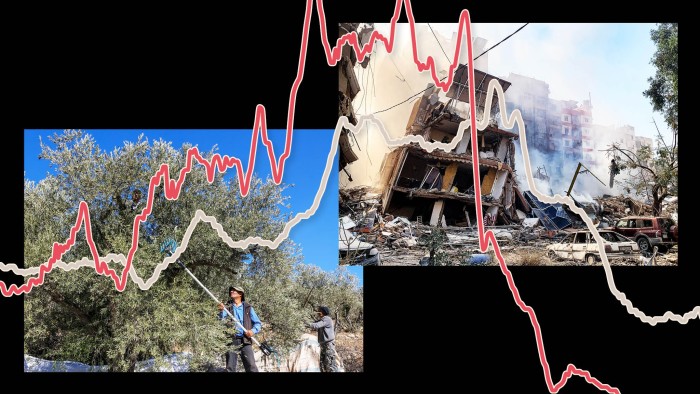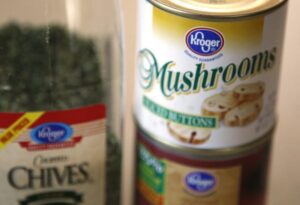Olive groves and orange orchards have been abandoned; merchandise is marooned in factories cut off by bombing; many bars and boutiques stand all but empty as depressed city dwellers avoid drinking and shopping.
Israel’s offensive against Hizbollah in Lebanon, which intensified sharply over the past two months and wreaked havoc on the country, has killed off a modest recovery that Lebanese businesses had been enjoying after four years of brutal economic crisis.
“Most sectors of the Lebanese economy have ground to a halt,” said Marwan Barakat, chief economist at Beirut-headquartered Bank Audi. Without a ceasefire, the economic damage could get much worse, he said: if the conflict continues to the end of 2025, “We’re talking about a minus 20 per cent growth forecast for next year.”
One wealthy businessman said he was refraining from eating out because “you don’t feel like it” — to many, it seems inappropriate to be spending money when so many are crammed into makeshift shelters, having lost their homes.
Officials have indicated that a ceasefire deal between Israel and Hizbollah could be imminent, and Israel’s security cabinet is due to meet on Tuesday afternoon to vote on an agreement. Even so, the effects of more than a year of conflict will be hard to overcome.


Lebanon was once the Middle East’s financial centre and has a proud commercial and trading heritage. But since 2019, its population has endured a 98 per cent collapse in the value of the local currency and a banking crisis that cut people off from their savings.
Grinding political deadlock has prevented these problems from being addressed, while a much-needed public debt restructuring has gone nowhere.
Lebanon’s economic crisis was rooted in years of financial mismanagement and corruption but was aggravated by events including the 2020 Beirut port blast and Covid-19 pandemic. In 2023, Hamas attacked Israel and war broke out in Gaza.
“Then you have a war happening on the Lebanese territory and you see your country being bombed every day,” said Anthony Massoud, chief executive of Ets Antoine Massoud, a major food and drink distributor. “Honestly, there is a limit to what the morale can take.”
Rather than the 0.9 per cent growth the World Bank had previously forecast, the bank now expects Lebanon’s real GDP growth to drop by 6.6 per cent this year. GDP had already shrunk by 34 per cent since 2019.
The worst affected region is south Lebanon, closer to the border with Israel — a verdant area rich with olive groves, banana plantations and citrus trees. The local economy relies on farming, but rural villages in a broad swath of the south have been virtually depopulated. The Israeli military has warned people not to return to their olive groves, causing a second year of largely lost harvest.
The World Bank estimates losses to Lebanon’s agricultural sector at $1.1bn.
Meanwhile, Israeli air strikes have razed the commercial centre in the southern town of Nabatiyeh and forced some factories to close. One southern factory owner, who deals in food products, said he and his employees fled midway through packing a shipment for export last month as air strikes drew closer and more frequent.
“We weren’t able to stay in the factory. We locked it. Whatever was loaded, we sent out directly,” he said, asking not to be identified to avoid drawing attention to his abandoned property.
He is still paying salaries for his more than 30 employees, most of whom are now homeless and have nothing to do.
Beyond farming and manufacturing, another critical source of income was curtailed as tensions mounted during the summer: holiday spending by the vast Lebanese diaspora, many of whom chose not to come or cut vacations short, fearing flight cancellations would leave them stranded in Lebanon.
By September, war had engulfed the country: more than 1mn people fled to safer areas as Israeli air strikes pounded southern and eastern Lebanon and Beirut’s southern suburbs, locations where Hizbollah dominates.
More than 600,000 people have left Lebanon for Syria, about a third of whom are Lebanese, according to the Lebanese government — the reverse of a large-scale movement of Syrians into Lebanon during their country’s more than decade-long civil war.
That outward movement has further reduced consumption, while sectors such as entertainment and fashion have foundered as the national atmosphere darkened.
Massoud said his sales of alcoholic beverages had fallen 70-80 per cent, and he has postponed opening a restaurant in central Beirut’s Saifi area because it is “no longer a place where you have a happy vibe”.
“When you’re not in a good mood, you’re not going to go shopping,” said Georges Estephan, managing partner at fast fashion franchiser Calia Group.
“This war was the final nail in the coffin of the economy,” said Diana Menhem, managing director of reform advocacy group Kulluna Irada. “We’ve been expecting a bit more than 1 per cent growth this year. And you saw what happened because of the war.”
34%Lebanon’s GDP has contracted since 2019
Businesspeople are hoping that a ceasefire before Christmas would encourage people back into stores to buy gifts. Others hope the Lebanese diaspora will be able to return for holidays, expecting them to spend at restaurants and bars.
There are spots of economic activity nonetheless, with vibrant nightlife in safer areas. One landlord said he had doubled the rent he is charging to eateries in his building in Dubayeh, an area north of Beirut, because business was thriving. And many Beirutis are adjusting to the frequent boom of air strikes: some bars and restaurants are starting to fill up again.
Massoud, the food and drink distribution chief — whose company distributes brands including Kellogg and The Laughing Cow — said specific goods were selling well.
He has seen strong demand for processed cheese and canned foods such as tuna and beans, along with oil, rice and pasta: products that do not require refrigeration and can be cooked over a fire in the absence of electricity. Massoud called them “war products”.
Lebanon’s economic crisis: a timeline
October 2019
In an unprecedented move, Lebanon’s banks close during mass protests, shaking confidence in the financial sector.
march 2020
The World Health Organization declares Covid-19 a global pandemic, and the Lebanese government defaults on its foreign currency denominated debt for the first time.
august 2020
Massive explosion in the port of Beirut rips through the capital, killing more than 200 people and deepening the crisis.
2022
Depositors desperate to access their own money stage “heists” at bank branches.
October 2023
Hamas’s attack on communities in southern Israel triggers Gaza war. In Lebanon, Hizbollah launches rockets into Israel to support Hamas.
October 2024
After a year of cross-border fire, Israel invades southern Lebanon.









